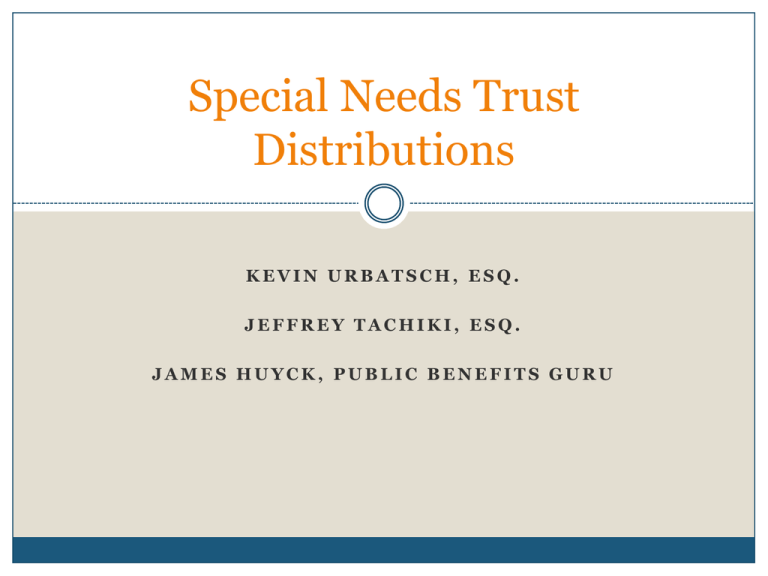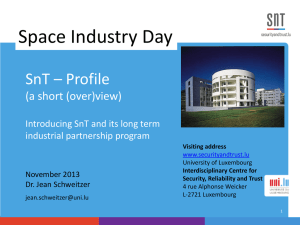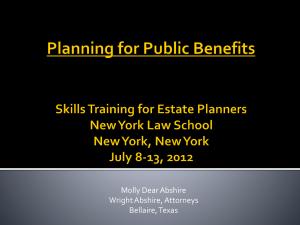
Special Needs Trust
Distributions
KEVIN URBATSCH, ESQ.
JEFFREY TACHIKI, ESQ.
JAMES HUYCK, PUBLIC BENEFITS GURU
SNT Distributions
Most challenging part of SNT administration
Trustee must understand:
Type of distribution standard
Type of special needs trust and when “sole benefit” rule applies
Type of public benefits SNT Beneficiary receives
Beneficiary’s current and future needs and balancing these
needs
Amount of assets held in the trust and investment allocation
What the future will hold as far as investment performance,
beneficiary’s condition, public benefits funding, and tax law
changes
Defining The Distribution Standard
A trust’s distribution standard sets forth the legal
standard for all distributions
Revocable living trusts often use a “broad” standard
(“comfort, welfare, happiness”) during settlor’s life;
Some trusts often use a “support” standard (“health,
education, maintenance and support”)
Other trusts use a mandatory distribution standard
(“must distribute all income on a monthly/annual
basis)
SNT Should Never Have Broad Distribution
Standard
Trust Distribution Standards that require
“mandatory” distributions or authorize
distributions for “support” or “maintenance”
are NOT Special Needs Trusts
If SNT has a “mandatory,” “support,” or
“maintenance” standard,
it must be modified
SNT Distribution Standards
There are two common SNT distribution standards:
Discretionary: This standard gives the trustee absolute
discretion to make (or not to make) distributions even
those that may reduce or eliminate beneficiary’s public
benefits
Supplemental: This standard gives the trustee absolute
discretion to make distributions except it does not
allow distributions that cause a loss or reduction in
public benefits
Beware the “Supplemental” Standard
Supplemental standard is common in older SNTs
No distributions allowed that may reduce or
eliminate public benefits
Thus, payments for food, shelter or medical
expenses covered by Medi-Cal exposes trustee to
potential breach of fiduciary duty claims
Solution is to modify the existing trust standard to a
discretionary distribution standard
Type of SNT Also Affects SNT Distributions
First Party SNT
Third Party SNT
Must be for the “sole
Does not have to be for
benefit” of SNT
beneficiary
No payments to spouse
or dependents
Exception: child or
spousal support order
“sole benefit”
May include two or
three current
beneficiaries
May allow for gifts to
third parties
What is “Sole Benefit” of Beneficiary
POMS definition of “sole benefit” states:
[I]f the trust benefits no one but that individual,
whether at the time the trust is established or at any
time for the remainder of the individual's life.
However, the trust may provide for reasonable
compensation for a trustee(s) to manage the trust, as
well as reasonable costs associated with investment,
legal or other services rendered on behalf of the
individual with regard to the trust.
Effect of “Sole Benefit” Rule
An SNT Trustee is not allowed to make payments to
anyone other than the SNT beneficiary
Problematic when Beneficiary wishes to make
payments to:
Children – especially minor children
Spouse
Parents
Friends
Oftentimes, the only way to make payments on
behalf of children is through child support order
SNT Trustee Duty on Distributions
Trustee’s balancing act is between
making distributions that do not
violate rules of the applicable benefit
program (typically SSI and Medi-Cal)
and providing the beneficiary goods
and services so he or she does not
have to live at the poverty level
Type of Public Benefits Affects SNT Distributions
SNT Beneficiary Receiving
SSI
SNT Beneficiary Receiving
Medi-Cal Only
Distributions for food
Distribution of food or
or shelter counted as
“ISM”
Distributions of cash
directly counted as
unearned income
Home purchase of any
value
shelter as long as
beneficiary pays %
Distribution of cash
may increase “share of
cost” and must be
spent by next month
Home purchase
$750,000 or less
Type of Public Benefits – Beneficiary Receives No
SSI or Medi-Cal
Trustee may then pay for anything authorized in
trust document
SNT disbursements have no effect on SSDI, Social
Security, and Medicare benefits
Type of Public Benefits – Section 8 Recipient
Payments on behalf of Section 8 housing recipient
may effect eligibility for that program
Periodic payments from SNT may increase rent owed by SNT
beneficiary and may disqualify from Section 8 entirely
Example: Payment of $100 phone bill each month will increase
beneficiary’s rental costs by roughly $33.33/month
Not true of all public housing agencies – only a few
enforce rule (e.g., San Mateo County)
No Brainer Distribution List
SNT Distributions That Do Not Affect SSI or
Medi-Cal
Generally, as long as the trustee understands the
basic rules, an SNT may pay for almost anything
The list on the next slide (a copy of which is much
more readable in your materials) provides a list of
items that if purchased for an SNT beneficiary will
have no effect on either SSI or Medi-Cal eligibility
The No-Brainer Distribution List
Automobile/van; Accounting services; Acupuncture/acupressure; Appliances (TV, VCR, DVD player, stereo, microwave,
stove, refrigerator, washer/dryer); Bottled water or water service; Bus pass/public transportation costs; Camera, film,
recorder and tapes, development of film; Clothing; Clubs and club dues (record clubs, book clubs, health clubs, service
clubs, zoo, advocacy groups, museums); Computer hardware, software, programs, and Internet service; Conferences;
Courses or classes (academic or recreational), including books and supplies; Curtains, blinds, and drapes; Dental work
not covered by Medicaid, including anesthesia; Down payment on home or security deposit on apartment; Dry
cleaning and/or laundry services; Elective surgery; Fitness equipment; Funeral expenses; Furniture, home
furnishings; Gasoline and/or maintenance for automobile; Haircuts/salon services; Hobby supplies; Holiday
decorations, parties, dinner dances, holiday cards; Home alarm and/or monitoring/response system; Home
improvements, repairs, and maintenance , including tools to perform home improvements, repairs, and maintenance
by homeowner; Home purchase (to the extent not covered by benefits); House cleaning/maid services; Insurance
(automobile, home and/or possessions); Legal fees/advocacy (may need court approval of legal fees if courtsupervised); Linens and towels; Magazine and newspaper subscriptions; Massage; Musical instruments (including
lessons and music); Nonfood grocery items (laundry soap, bleach, fabric softener, deodorant, dish soap, hand and
body soap, personal hygiene products, paper towels, napkins, Kleenex, toilet paper, and household cleaning products);
Over-the-counter medications (including vitamins and herbs); Personal assistance services not covered by Medicaid;
Pet and pet supplies, veterinary services; Physician specialists if not covered by Medicaid; Private counseling if not
covered by Medicaid; Repair services (e.g., for appliances, automobile, bicycle, household, or fitness equipment);
Snow removal/landscaping/gardening (lawn) services; Sporting goods/equipment/uniforms/team pictures;
Stationery, stamps, and cards; Storage units; Taxicab; Telephone service and equipment, including cell phone, pager;
Therapy (physical, occupational, speech) not covered by Medicaid; Tickets to concerts or sporting events (for
beneficiary and an accompanying companion, if necessary); Transportation (automobile, motorcycle, bicycle, moped,
gas, bus passes, insurance, vehicle license fees, gas, car repairs); Utility bills (satellite TV, cable TV, telephone—but not
gas, water, or electricity); Vacation (including paying for a personal assistant to accompany the beneficiary if
necessary).
More Difficult SNT Distributions
- Paying For Food and Shelter
SSI RECIPIENT
MEDI-CAL ONLY RECIPIENT
Paying Food or Shelter – SSI Recipient
Payment of food or shelter
is counted as ISM and will
reduce SSI by PMV or VTR
amount
• Remember from public benefits
presentation this morning
Shelter Defined
Shelter is defined as:
•Gas, electricity, water,
sewer, heating fuel, garbage
removal, real estate taxes,
rent or mortgage
Paying Food or Shelter Example – SSI Recipient
Trustee pays $2,200/month rent on behalf of SNT
beneficiary. SNT Beneficiary’s SSI check is reduced
by $244.67 (which is PMV or 1/3 of the federal
portion of the SSI plus $20 in 2009-2010)
Trustee can then pay all of beneficiary’s food, gas,
electricity, water, sewer, heating fuel, and garbage
removal with no further reduction in SSI
Caution when Paying for Food and Shelter – SSI
Recipient
Beware the SNT Beneficiary who is receiving less
than $244.67
ISM calculation is not 1/3 of SSI check, but 1/3 of federal
portion of SSI check
Thus, if SSI recipient is receiving less than $244.67 in SSI will
lose SSI and categorical eligibility for Medi-Cal
Max SSI in 2009-2010 with federal and California portions is
$845/month
Paying Food or Shelter - Medi-Cal Only Recipient
If SNT Beneficiary not receiving SSI but is eligible for
Medi-Cal – Trustee may pay for food and shelter
However, Medi-Cal recipient should pay certain
percentage of own living expenses
Rule of Thumb, have Medi-Cal recipient pay 10% of food and
shelter and have SNT pay balance
Giving Cash Allowance to SNT
Beneficiary
SSI RECIPIENT
MEDI-CAL ONLY RECIPIENT
Giving Cash to Beneficiary – SSI Recipient
Cash from any source to an SSI recipient is counted
as unearned income
Unearned income reduces the monthly SSI check $1
for $1 after the first $20
Example: SNT beneficiary receives $500/month
allowance from SNT. The first $20 is fine, however
the SSI monthly check is reduced by $480. Thus, the
SNT beneficiary loses $500 from SNT assets but only
receives a net benefit of $20. Further, if SSI received
was less than $480 to begin with, then loses
eligibility for SSI
Giving Cash to Medi-Cal Only Recipient
Medi-Cal for persons who do not receive SSI because
of too much income is generally received through
“share of cost”
“Share of cost” is like a co-pay for insurance
Cash from an SNT to a Medi-Cal only recipient will
increase “share of cost” Medi-Cal
Thus, if SNT pays $500 to a “share of cost” Medi-Cal
eligible person, his or her co-pay will be increased
the full $500
Buying a Home
Authority to Purchase Home
SNT document must not exclude purchase of home
If trust is silent, purchase is authorized under
California law
One primary residence is an exempt asset
SSI purposes any value
Medi-Cal only recipient exempt up to $750,000
Petition to court for permission to purchase home is
recommended
May be required in some jurisdictions for Court supervised
SNTs
Buying a Home – Practical Challenges
There are practical challenges an SNT trustee must
consider when purchasing a home:
Does the SNT have sufficient assets to purchase the home?
Should the home be purchased outright or by mortgage?
Should the home purchase be in some form of joint
ownership?
How should ownership responsibilities be allocated?
How should home repairs and maintenance be paid for?
Should the trustee charge rent to cohabitating family
members?
Outright Purchase – SSI Recipient
Outright purchase
Home purchase will not interfere with SSI (at any value) or
Medi-Cal (as long as under $750,000)
Month of purchase, home will be counted under ISM rules. Meaning
loss of SSI of $244.67 for one month only
Every other month, SNT beneficiary has an "equitable home
ownership under a trust" so is not considered to be receiving rentfree shelter
Nor is the SNT beneficiary required to pay rent
Title can be held in name of SNT or in SNT Beneficiary’s name (may
not want for other reasons, e.g., susceptible to undue influence)
Mortgage Purchase – SSI Recipient
Purchase by mortgage
Trust can own home but payment of mortgage is treated the same as
rent, meaning SSI amount will be reduced by ISM so SNT beneficiary
will lose PMV amount of $244.67 each month of mortgage payment
Practically can be very hard for an SNT to be able to find a company
willing to provide a mortgage to a trust. If located, often at very high
interest rate
SNT trustee purchases a home for $500,000 by paying half in
cash and half through a mortgage with monthly payments of
$1,200 for 20 years, the SNT beneficiary would lose $244.67
(the 2009 PMV amount) of SSI in the month of purchase as
ISM. Going forward, each and every month the mortgage is
paid, the SNT beneficiary would lose $244.67 as ISM
Joint Ownership
Sometimes SNT beneficiary’s and relatives will seek
to have the SNT become a co-owner with parents or
other relatives
In some situations ok, but rarely a good idea
Each owner is required to pay his, her, or its fair
share of home expenses
SNT rarely has bargaining power if parents decide to
stop paying (evict parent/caregiver? – partition
action)
Also, if co-owners have creditor issues, divorce, or
take a lien on their part of property, causes problems
Paying Household Expenses – SSI Recipient
Household operating expenses considered shelter are
Mortgage (payments on a mobile home are considered mortgage payments);
Rent;
Real property taxes;
Heating fuel;
Gas;
Electricity;
Water;
Sewerage;
Garbage collection services;
Homeowner's insurance required by a lender;
Condominium charges that include any of the above items.
NOTE: SSI will be reduced in the month that any such household expenses
are made. However, household operating expenses that are billed on an
annual basis (e.g., property taxes) must be converted to monthly amounts.
For example, property taxes in the yearly amount of $4,200 result in $350
of ISM per month (4,200 ÷ 12 = 350), resulting in a benefits reduction
Household Expenses That Can Be Paid – SSI
Recipient
Not all household-related expenses are counted as
ISM for SSI purposes, the following useful items can
be paid for by the trustee without causing an SSI ISM
benefits reduction:
Telephone, cell phone, answering machine;
Cable or satellite television, DVD/video players;
Internet access;
Repairs to the home; or
Capital improvements to the home
Payment for Modification to Home Owned by
SNT beneficiary or the SNT – SSI Recipient
When SNT pays for improvements or renovations to
the home, the beneficiary does not receive income
even if the home is in the name of the beneficiary
Disbursements from the trust for improvements
increase the value of the home and, unlike household
operating expenses, do not provide ISM
For example, renovations to the bathroom to make it
accessible or installation of a wheelchair ramp or
assistance devices are not considered income and
will not interfere with SSI
Payment of Modifications To Home Owned by
Another
Propriety of doing so is not clear if the beneficiary has no
interest in the home
On the one hand, the modification provides a direct
benefit to the beneficiary and improves his or her quality
of life by accommodating his or her living environment to
his or her disabilities
On the other hand, the result of the modification can be
an outright SNT distribution of a substantial amount to a
homeowner that is potentially detrimental to an SNT
beneficiary. The homeowner could later sell the property,
die, lose the property through foreclosure, have future
creditor issues, or evict the beneficiary. Protections
should be considered such as life estate, property
agreement, co-ownership
Buying an Automobile
Buying an Automobile
Purchase of an automobile (and even distribution of
the automobile to the SNT beneficiary) will not affect
public benefits eligibility as long as it is the
beneficiary's only automobile, because one
automobile of any value is an exempt resource
Holding Title to Automobile
Title should be held by someone other than SNT trustee,
typically a parent/caregiver although SNT beneficiary
can also be titleholder of one car
Trustee of the SNT should still be named as a lien holder
on the automobile so that the individual with ownership
cannot sell or borrow against the vehicle
If first party SNT, it may be prudent to get a court order
authorizing that title be held in the name of the
individual primarily responsible for using the
automobile, because the purchase may otherwise be
considered a gift to the individual
Materials include agreement for automobile user
Purchasing Second Automobile
SNT Beneficiary can own one automobile in his or
her own name
If SNT beneficiary needs more than one automobile,
an SNT can own the second car without causing any
problems with public benefits eligibility
Hiring a Caregiver
Issues when Hiring Caregivers
Trustee must determine:
(1) does the SNT have sufficient funds to pay?
(2) is the proposed caregiver capable of providing the required
level of care?
(3) is the compensation reasonable ?
(4) should the caregiver be an employee or independent
contractor?
(5) is the proposed caregiver someone who can be legally hired
Caregiver as Independent Contractor
or as an Employee
Caregivers are hired in a variety of ways, but are
invariably either employees or independent contractors
Safer to hire caregiver as employee
When trustee hires as an independent contractor, the
trustee may inadvertently and unknowingly assume the
role of an employer of the caregiver and thus will have
the same obligations and liability as any employer
Severe penalties and fines may arise if taxes go unpaid or
if wage and hour laws and workers' compensation
requirements are ignored
Hiring Parents as Caregivers
Parents are often the most likely candidates to be
caregivers because they are aware of the child's
needs, often provide better care, and may cost less
than a third party hired through an agency
Issues may arise if SNT beneficiary is a minor
because of parents’ duty of support plus may affect
eligibility for SSI with deeming
Some States (not California) state that SNTs cannot
pay parents to provide any care giving services at any
time through his or her child’s life
Hiring Undocumented Caregiver
Trustees should not pay for caregivers who lack legal
documentation
This issue often poses problems for SNT beneficiaries
who are citizens, but whose parents are not legally in this
country
Trustee cannot hire these parents as caregivers, even
though they may be capable of providing care (and
indeed are already likely providing a substantial amount
of care and providing more attentive care than a third
party caregiver would), and would do so economically
Possible criminal liability
Hiring the IHSS Worker as Caregiver
Sometimes it makes sense to hire the IHSS caregiver, the
IHSS caregiver already understands beneficiary's needs
and may be less expensive than hiring agency caregivers
When hiring a IHSS caregiver, a trustee cannot
supplement the pay of the caregiver for the IHSSapproved hours
If IHSS provide 10 hours a month at $10 an hour, a
trustee cannot augment the worker's salary by paying an
additional $5 hour on top of the $10
Trustee can hire the IHSS caregiver for additional hours,
and pay a premium wage for those hours
Example of Hiring IHSS Worker as Caregiver
If IHSS worker is being paid $10/hour for 10 hours, the
SNT can pay $20 an hour for an additional 10 hours,
which brings the IHSS's worker pay up to $15 an hour for
all the work provided
WARNING: The services provided during the hours
paid by the trustee must be different than the services
provided by IHSS. If the services are the same, the hours
provided by IHSS may be reduced. For example, if IHSS
pays for two baths a week and the trustee agrees to pay
for five baths a week, then IHSS will cease paying for the
two baths a week because it only sees a need for two.
Analyzing Specific Types of
Distribution Requests
THE WIDE WONDERFUL WORLD OF
INTERESTING, SALACIOUS, AND
DOWNRIGHT WEIRD DISTRIBUTION
REQUESTS
KEVIN URBATSCH
ATTORNEYS FROM THE ACADEMY OF
SPECIAL NEEDS PLANNERS
Donations to Charity or Church
First Party SNT must distribute for “sole benefit” of
SNT Beneficiary:
Donations to charities are gifts and will be disqualifying
transfers
Third Party SNT may give donations but only if the
document allows it – does not have to be for
beneficiary’s “sole benefit”
Experimental Medical Treatments
SNT can pay for medical expenses not covered by
Medi-Cal. Typically for dental work, durable medical
goods and cosmetic surgery
More troubling are experimental treatments
One requests was for hyperbaric chamber therapy for a young
adult with a spinal cord injury costing $40,000 and it nearly
exhausted the trust
Trustee sought court authorization and no objection. Attorney
advised against it, but the parents were insistent. It did not
seem to help
Paying for Therapies
Common therapies are speech therapy, occupational
therapy, or physical therapy. Again, if Medi-Cal will
not cover, the SNT can pay for without penalty
More exotic therapies include horse therapy and
aquatic therapy
Very common for people with autism and cerebral palsy
SNT can also purchase a horse or a pool for the SNT
Beneficiary
If to be court supervised, it is best to get a doctor to prescribe
the therapies so there is proof of need
Paying for Vacations
Vacations can be paid for from an SNT
Payment for hotel and restaurants is not considered
ISM if person is temporarily absent from primary
residence for up to 30 days
Logistics can be difficult, pre-paid vacations are
easiest to manage otherwise possible to reimburse
companions, pay credit card expenses but cannot
reimburse SNT beneficiary directly
If SNT beneficiary requires assistance to travel, SNT
can pay for caregivers
Timeless Art of Seduction
Several SNT beneficiaries have sought payments for:
On-line dating services (No brainer)
Birth control (not paid for by Medi-Cal)
Sex toys and aids (No brainer)
Third Party SNT, Generally Fine - First party SNT
Fine for Beneficiary, but not for Spouse:
Dinner, flowers, shows or gifts (remember no gifts allowed
from First Party SNT)
Engagement and Wedding rings
Marriage
Honeymoon
When the Timeless Art of Seduction Fails:
Pornography and Prostitution
Legal pornography (whether on-line, movies, or
print) can be purchased for SNT Beneficiary
ASNP’s best read article
Best to set boundaries early
Strip clubs – mostly cash business, not much can be done; gift
card or gift certificate?
Prostitution – Nothing illegal
One client had no other needs. All he wanted was to pay for a
prostitute once every six months
Trip to Nevada where prostitution is legal
What happens in Vegas, stays in Vegas?
Can I Go Gambling?
The SNT can certainly pay for the hotel, show and
travel but probably not the actual gambling
It is possible that the SNT beneficiary could receive a
cash advance from a credit card (or use their public
benefit money) to gamble with but if they win, that
money would be counted against their SSI and MediCal asset limitation and really not the best use of
funds
Generally just say NO to cash for gambling
Life Preservers?
An SNT beneficiary had a problem keeping his hands
to himself. His family requested that the SNT
Trustee purchase life jackets for the women to
protect their breasts from his groping hands
Can I Buy a Race Car?
One SNT Beneficiary who was quadriplegic made
this request, SNT assets were significant
Second SNT was established to hold the race car and other
automobiles. Hired a driver and SNT beneficiary travelled to
different races
If there are to be multiple car purchases, usually a good idea to
set up separate SNT to hold cars, boats, RVs and related items
for liability reasons
My Dog Needs Surgery, Can My Trust Pay for It?
A common request is for pet supplies, veterinarian
services, pet food, pet toys, and anything else pet
related
An excellent use of SNT funds
I Need a Vaporizer for My Medicine?
A vaporizer in common parlance is known as a
“bong” and the medicine was marijuana
Trustee cannot pay for items that are illegal. However a bong is
not illegal in and of itself so purchase can be made for that
Depending on how comfortable you are with medical
marijuana laws possible to pay but I see a big problem with
federal laws prohibiting it
Can I Start a Pot Farm for Medical
Marijuana?
Request was made by SNT Beneficiary and when
rejected by attorney SNT Trustee (Mom) and SNT
Beneficiary started farm anyway
Second request (which was granted) was for criminal defense
attorney to respond to charges against SNT beneficiary (and
SNT Trustee) for drug possession, intent to distribute and gun
possession
SNT Trustee was named because property where pot was being
grown was owned by SNT
Can the SNT Buy a Business?
SNT Trustee agreed to purchase a partial ownership
in a car wash that was owned and run by
beneficiary’s Father
As long as meets SNT’s investment standard, the
SNT can purchase
Harder for court supervised first party SNT
SNT Beneficiary works there part time and qualifies
for private health plan
Avon Lady?
One male SNT Beneficiary wanted funds to become
an “Avon Lady” - his words
SNT Trustee purchased a starter kit and he is doing
ok with it
May trigger issues with working while on benefits
Should consult with benefits consultant to determine
work programs with public benefits “Ticket to Work”
“250% Working Program” “PASS”
How About a Treadmill?
Exercise equipment is good, not so good if SNT
beneficiary cannot use it
One mom requested the purchase of a treadmill for
her son, the SNT beneficiary. Her son used a
wheelchair for mobility, she wanted reimbursement
for her purchase of the treadmill because she said
her son was like Christopher Reeves and it was part
of his therapy, SNT Trustee asked for a prescription,
mother refused. SNT Trustee refused
Remember “Sole Benefit Rule”
Purchasing Video Games and CDs
Certainly ok, but in one case:
SNT Beneficiary kept asking to spend TONS of money on blue
ray CDs and games
SNT Trustee was really starting to think he was selling them on
the street to use the money for other items, Trustee had hired a
care manager to check into it. He confirmed that the
beneficiary had quite an extensive collection of games and
movies in his home
Because of the overall value, SNT Trustee increased the
coverage on renters insurance policy
Paying for the SNT Beneficiary’s Funeral
In Termination Section of this Program we will learn
about potential difficulty in paying for funerals in
first party SNT when the Beneficiary receives SSI
SNT Trustees may wish to explore beneficiary’s
thoughts on burial
SNT Trustee may pre-pay for funeral (burial plots or
burial insurance of any amount) but if set asides
money for burial can only add up to $1,500 (if in
beneficiary’s name)
Can I Purchase Alcohol or Cigarettes?
A common request by many SNT Beneficiaries is for
purchase of alcohol or cigarettes
The only issue is whether such distributions are considered
food. Doubtful. But, even if considered food it only applies for
SNT Beneficiary who is SSI recipient and then would be ISM
Check the trust document, some Third Party SNTs
specifically prohibit the purchase of such items
Typically, I advise to have the SSI or SSDI money be
used. Try to have SNT pay for items that beneficiary
used to have to purchase themselves, e.g. phone
Can SNT Pay for Health Insurance or Co-Pays?
Many SNT Beneficiaries cannot receive private
health insurance at any price due to pre-existing
conditions
Some SNT Beneficiaries do qualify for private health
insurance
Depending on amount held in trust and the plan, I
always recommend paying for private health plans
and co-pays. Generally better coverage and does not
interfere with Medi-Cal eligibility
Forklift vs. Elevator?
Parent as SNT trustee purchased a used forklift
(without consulting attorney) so she could hoist her
quadriplegic adult son into her split level home via
the deck when he came to visit
Fortunately, attorney was able to convince her this
was a safety issue before she actually tried it
Instead petitioned the Court and received approval to add
elevator to her home because son visits just about every day
Good news, she sold the forklift for a profit!
SNT Distribution Conclusion
Issues that need to be considered on each
distribution:
Does the trust document allow it?
Are there sufficient funds to cover it and to comply with intent
of trust for the future needs of beneficiary?
Will it interfere with public benefits?
If it interferes is it in beneficiary’s best interest to pay?
How will distribution be made? Directly/online/reimbursement/other










